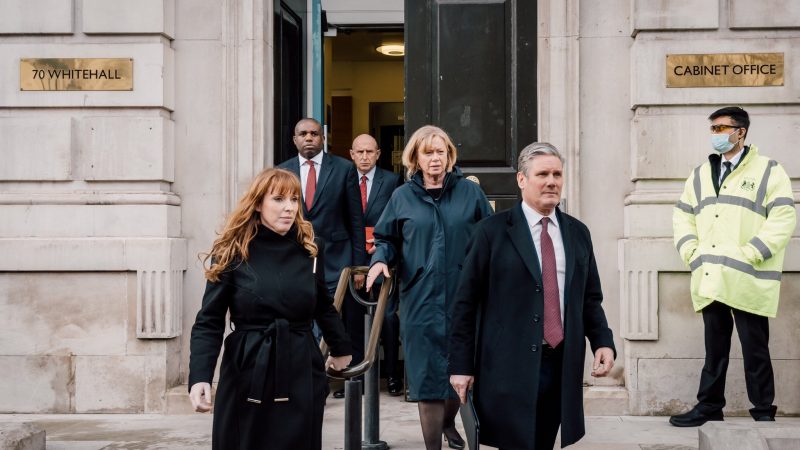
Rishi Sunak takes the helm of a Conservative Party incapable of governing Britain. It is a party of three irreconcilable factions. The first group are the ‘Cameronites’ – those still believing Thatcherite dogma is an immutable fact and an election-winning strategy when presented by a friendly face. The second are the ‘dreamers’ – those believing the contradiction between economic growth and maintaining support for a hard Brexit can be addressed. The third, the ‘entryists’, advocate a marriage of nationalism and what we now call ‘Trussonomics’.
All three share some common misunderstandings; modern Conservatism is predicated on a fundamental misunderstanding of state, market, and society. And yes, there are some lessons for the Labour Party here, too.
To the Tories of today, the state crowds out the market and stifles innovation. This view of the state dates back to the birth of the current ‘neoliberal’ order, driven by the ideals of emancipation, liberty and enterprise born at the end of the Keynesian and Fordist consensus in the late 1970s. But this is not what the state is now – and the Conservatives should know, because they played an instrumental role in crafting its current form.
The state has moved from an all-powerful mass with innate capabilities of its own, to becoming a convenor, curator, and a strategic function. Privatisation, the creation of devolved administrations, and the growing role of international institutions are many of the trends that have fundamentally transformed Britain.
To deploy a cliche, the state is now best placed to steer, not row. Oddly, the Conservatives most successful policy of the past 12 years, is a perfect example of this. Through targeted funding, intelligent procurement and partnership with a variety of public and private actors, the Covid vaccine rollout could become a model for public sector delivery. A state that steers a group of stakeholders towards a clearly defined outcome represents the future of government: the days of vast bureaucracies are over.
To the Conservative Party, financial markets are the economy. The financial system has been comprehensively decoupled from the real economy, welfare and public services. Healthcare is a key example; vast numbers of Britons are out of work due to long-term health conditions, a trend accelerated by the pandemic. Investment in healthcare is an investment in Britain’s economy. And yet, in the name of financial stability, further cuts to public services are expected. This is a political choice. Taxes could go up, but they will not. Put simply, the need to pacify markets comes above the need to deliver for citizens. This approach will yield nothing but low growth, minimal redistribution and the entrenchment of vested interests; it will conserve our broken status quo.
It cannot be forgotten that our institutions are here to serve society. Margaret Thatcher didn’t believe there was such a thing as society. She was wrong. Even David Cameron saw this and, flailing, attempted to construct a ‘big society’. The challenge with creating a ‘big society’ – intended to fill the gaps in provision his government refused to fill – is simply that funding and organisation are required to deliver equitable outcomes. Humans are benevolent, but they cannot self organise at a scale required to make this idea credible.
At least Cameron tried. Other Conservative leaders haven’t bothered since. The pandemic revealed a desire for solidarity and collectivism that emphasised the bonds between us. People rediscovered society, ironically, in a time of forced isolation. Reinvigorating a sense of community and togetherness has not been on the agenda of any political party for some time and must form the bedrock of any new governing platform.
The divergence between the reality of our moment and the 1970s toolkit used to analyse the state, market and society, has yielded a rudderless brand of Conservatism. They are a party out of ideas, neither acknowledging the death of the neoliberal consensus nor trying to shape what comes next. Each Tory faction indulges in a misguided view of state, market and society and, as things stand, the Conservatives are so fixed in their worldview that a new approach to governing cannot emerge while they are in office.
Sunak’s Conservatives have already stabilised financial markets. A Brexit supporting, culture war waging Thatcherite, however, cannot deliver the change Britain needs. Keir Starmer’s Labour is showing early signs that it understands the need to shape a new governing paradigm. Root-and-branch change starts with a reimagination of the state, market and society.
To some, we live in an age of perpetual crisis. In the short term, this may be true. But in the medium- to long-term, a government understanding the need to govern through networks of actors, prioritise real economic outcomes and restore a sense of collectivism may just be able to begin building what comes next.




More from LabourList
Antonia Romeo appointed to lead civil service as new Cabinet Secretary
‘If Labour is serious about upskilling Britain, it must mobilise local businesses’
Stella Tsantekidou column: ‘What are we to make of the Labour Together scandal?’